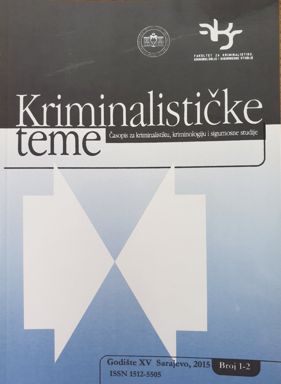KRIVIČNOPRAVNI ASPEKTI RAZBOJNIŠTVA U KRIVIČNOM ZAKONODAVSTVU BOSNE I HERCEGOVINE
CRIMINAL LAW ASPECTS OF ROOBERRY IN CRIMINAL LEGISLATION OF BOSNIA AND HERZEGOVINA)
Author(s): Elvir SinanovićSubject(s): Criminal Law, Criminology, Penal Policy
Published by: Fakultet za kriminalistiku, kriminologiju i sigurnosne studije Univerziteta u Sarajevu
Keywords: robbery; legal theory; judicial practice;
Summary/Abstract: Inspiration for Work and Possible Problems Appearing During the Work Procedure: In the structure of classical crime in our country, according to all statistical indicators, the crimes against property prevail. Among them, the highlight is on crimes that involve obtaining or keeping material benefit for oneself or another by using violence or unlawful force. That is primarily robbery. Beside its actuality, the main source of inspiration for writing this work derives from certain disharmony of attitudes in the criminal law theory and judical practice due to some criminal-legal (constitutively) elements of robbery, which at the same time represent one of the crucial problems in the theoretical-empirical research. Goals of Work: The goal of this article is to define robbery as a criminal-legal problem, especially in Bosnian legal system, through the prism of domestic and foreign legal-theoretical findings as well as judical practice. Methodology/Design: The primary questions of the paper focus on explanation of criminal-legal elements, which are the core of robbery, qualifying its form, as well as the relationship with other criminal activities against property. The main method used in the paper is content analysis, by applying comparative and partially descriptive methods to define main items. Work Limitations: The main limitation in this work refers to qualitative analyse of smaller number court verdicts that do not have any time connection, nor refer to any definite court facility. Therefore, the further research into a criminal-legal robbery element should comprise quantitative analyse, bigger number judicates of definite court facility within definite period of time. Results/Findings: Robbery, as any other crime, is strictly defined by law. However, besides the existing adequate robbery legal infrastructure in the court practice, there are definite criminal-justice disharmony and distinction in the legal procedure. It is primarily about accomplice, robbery with mortal consequence, its relation towards other crimes etc. General Conclusion: Having known criminal law theory, legislative structure, harmony with theoretical-practical attitudes and consistency in the court procedure are necessary to bring robbery to trial successfully, in other words passing the correct court sentence. In order to achieve mentioned goals, it is necessary permanent scientific-theoretical study of these issues. Validity of Work: This paper represents a useful source of information, not only for an academic association but for practitioners in the field of criminal science. This article can help and be a landmark to criminal justice institution in the view to harmonise practice during the same or similar criminal cases. In the end, this work should stimulate definite theoretical disputes to overcome inconsistency in treating and improvement on quality in the field of court making decisions.
Journal: Kriminalističke teme – Časopis za kriminalistiku, kriminologiju i sigurnosne studije
- Issue Year: XV/2015
- Issue No: 1-2
- Page Range: 35-62
- Page Count: 28
- Language: Bosnian, Croatian, Serbian

